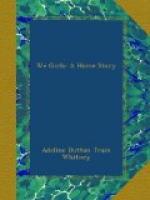The bread-box was sweet and empty; the fragments had been all daintily crumbled by Ruth, as she sat, resting and talking, when she had come in from her music-lesson; they lay heaped up like lightly fallen snow, in a broad dish, ready to be browned for chicken dressing or boiled for brewis or a pudding. Mother never has anything between loaves and crumbs when she manages; then all is nice, and keeps nice.
“Clean beginnings are beautiful,” said Rosamond, looking around. “It is the middle that’s horrid.”
“We won’t have any middles,” said Ruth. “We’ll keep making clean beginnings, all the way along. That is the difference between work and muss.”
“If you can,” said Rose, doubtfully.
I suppose that is what some people will say, after this Holabird story is printed so far. Then we just wish they could have seen mother make a pudding or get a breakfast, that is all. A lady will no more make a jumble or litter in doing such things than she would at her dressing-table. It only needs an accustomed and delicate touch.
I will tell you something of how it was, I will take that Monday morning—and Monday morning is as good, for badness, as you can take—just after we had begun.
The room was nice enough for breakfast when we left it over night. There was nothing straying about; the tea-kettle and the tin boiler were filled,—father did that just before he locked up the house; we had only to draw up the window-shades, and let the sweet light in, in the morning.
Stephen had put a basket of wood and kindlings ready for Mrs. Dunikin in the kitchen below, and the key of the lower door had been left on a beam in the woodshed, by agreement. By the time we came down stairs Mrs. Dunikin had a steaming boiler full of clothes, and had done nearly two of her five hours’ work. We should hand her her breakfast on a little tray, when the time came, at the stair-head; and she would bring up her cup and plate again while we were clearing away. We should pay her twelve and a half cents an hour; she would scrub up all below, go home to dinner, and come again to-morrow for five hours’ ironing. That was all there would be about Mrs. Dunikin.
Meanwhile, with a pair of gloves on, and a little plain-hemmed three-cornered, dotted-muslin cap tied over her hair with a muslin bow behind, mother had let down the ashes,—it isn’t a bad thing to do with a well-contrived stove,—and set the pan, to which we had a duplicate, into the out-room, for Stephen to carry away. Then into the clean grate went a handful of shavings and pitch-pine kindlings, one or two bits of hard wood, and a sprinkle of small, shiny nut-coal. The draughts were put on, and in five minutes the coals were red. In these five minutes the stove and the mantel were dusted, the hearth brushed up, and there was neither chip nor mote to tell the tale. It was not like an Irish fire, that reaches out into the middle of the room with its volcanic margin of cinders and ashes.




